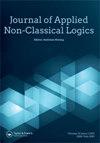A note on the complexity of S4.2
Q1 Arts and Humanities
引用次数: 1
Abstract
is the modal logic of directed partial pre-orders and/or the modal logic of reflexive and transitive relational frames with a final cluster. It holds a distinguished position in philosophical logic, where it has been advocated as the ‘correct’ logic of knowledge; it has also found interesting applications in the temporal logic of relativistic spacetime and the metamathematics of forcing in set theory. The satisfiability problem for is -complete: this is a result established in an AiML 2004 paper of Shapirovsky [(2004). On PSPACE-decidability in transitive modal logic. In R. A. Schmidt, I. Pratt-Hartmann, M. Reynolds, & H. Wansing (Eds.), Advances in modal logic 5 (pp. 269–287). King's College Publications] where the complexity classification of emerges as a consequence of a very general method for constructing decision procedures for transitive modal logics. We provide here a ‘classical’ proof in the standard Halpern-Moses style of Halpern and Moses [(1992). A guide to completeness and complexity for modal logics of knowledge and belief. Artificial Intelligence, 54(2), 319–379]. With little extra work, it is shown that the -completeness result extends to , the multimodal version of . We prove that the -completeness characterisation of monomodal persists even if we restrict ourselves to fragments with bounded modal depth, but the problem is -complete when it is restricted to formulae with modal depth at most one. The complexity of satisfiability for the fragment of the language with a finite number of propositional variables (but unbounded modal depth) remains -hard. For a finite language and bounded modal depth, -satisfiability can be checked in linear time.关于S4.2的复杂性的说明
是有向部分预购的模态逻辑和/或具有最终簇的自反和传递关系框架的模态逻辑。它在哲学逻辑中占有独特的地位,被认为是“正确的”知识逻辑;它还在相对论时空的时间逻辑和集合论中强迫的元数学中找到了有趣的应用。is -complete的可满足性问题:这是Shapirovsky[(2004)]在AiML 2004论文中建立的结果。传递模态逻辑中的pspace可判决性。在R. A.施密特,I.普拉特-哈特曼,M.雷诺兹和H.万辛(编),模态逻辑的进展5(第269-287页)。King's College Publications],其中的复杂性分类作为构建传递模态逻辑决策过程的一种非常一般的方法的结果而出现。我们在这里提供了一个标准Halpern-Moses风格的“经典”证明[(1992)]。知识和信念模态逻辑的完备性和复杂性指南。人工智能学报,2014 (2),319-379 [j]。只需很少的额外工作,就可以证明-完备性结果可以扩展到。我们证明了单模态的-完备性即使限定在模态深度有界的片段中仍然存在,但当限定在模态深度最多为1的公式时,问题是-完备的。具有有限数量的命题变量(但无界模态深度)的语言片段的可满足性的复杂性仍然是困难的。对于有限语言和有界模态深度,可以在线性时间内检验-可满足性。
本文章由计算机程序翻译,如有差异,请以英文原文为准。
求助全文
约1分钟内获得全文
求助全文
来源期刊

Journal of Applied Non-Classical Logics
Arts and Humanities-Philosophy
CiteScore
1.30
自引率
0.00%
发文量
8
 求助内容:
求助内容: 应助结果提醒方式:
应助结果提醒方式:


